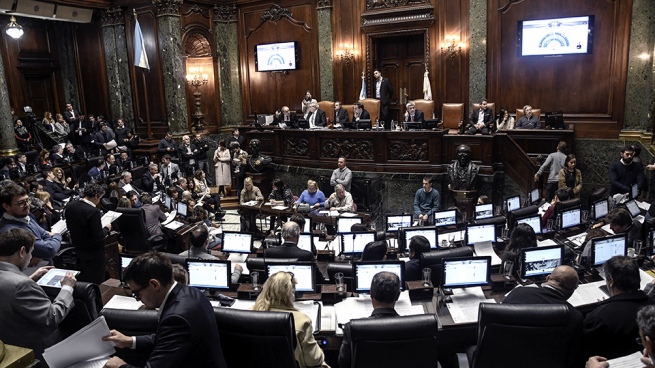The Legislature of Buenos Aires gave this Thursday a first sanction to the law that stops the future construction of towers in two polygons of the Buenos Aires neighborhoods of Belgrano and Núñez, in the north of the City of Buenos Aires, in response to neighborhood claims against the wave of high-rise buildings in residential areas characterized by having low houses.
The norm had 31 positive votes from the official block of Vamos Juntosaccompanied by the UCR-Evolution; five negatives from the bench of La Libertad Avanza and 20 abstentions from the Front of All and the Front of the Leftduring the ordinary session of the Buenos Aires Parliament.
Strictly speaking, were sanctioned at first reading two files presented by the government to reform the Urban Code of 2018, that, at that time, modified allowable heights for new construction in the City and raised the permitted ceilings in many neighborhoods, which generated complaints in some residential areas.
Although dozens of neighborhood groups emerged in rejection of the appearance of towers; among them Villa Ortúzar, Colegiales and Parque Chacabuco; The legislators took the claims of the residents of the neighborhoods of Belgrano and Núñez, and transferred them to the area of the Buenos Aires Government in charge of the urban planning guidelines.
This is how they came to draft two bills to nullify the provisions of the Code and In this way, prevent the proliferation of high-rise buildings in these two polygons. and, on the other hand, they can preserve the identity of each neighborhood without alterations in its morphology.
They seek to preserve urban planning in Núñez and Belgrano
More information ➡️https://t.co/SjbA0chLJw pic.twitter.com/SXPKo8QBtj
– CABA Legislature (@LegisCABA) May 19, 2022
two initiatives
The first proposal of the president of the Let’s Go Together block, Diego García Vilas, contemplates the “New Belgrano” area, bounded by Sucre, Migueletes, Monroe, Ramsay, Blanco Encalada, Cazadores, Mendoza, Dragones, Juramento, Húsares, Echeverría and Ramsay streets.
There, constructions that are not “single-family houses” were prevented from being erected on plots that have up to 1500 square meters of extension, as well as the possibility of installing gastronomic businesses; however, it leaves the permit for buildings of up to six floors on large plots.
Over there, the neighborhood collective resists the advance of towers in blocks with low houses, but also opposes the appearance of new commercial premises, especially restaurants and breweries, which were enabled by the 2018 urban regulations.
The other initiative of the UCR legislator Manuela Thourte, raised “the landscape conservation of the polygon delimited by Vedia streets, the roads of the FFCC Mitre, Vilela and Cuba”, which he calls “Lomas de Núñez”.
So, in 36 identified blocks, buildings with more than two floors cannot be built, and it will be prohibited in “level”, which makes it possible to match the meters in height of an adjoining construction.
In that sense, the legislator Matías Barroetaveña, from the Front of All, asked, during the debate, “take charge of the fact that the Urban Code that they voted for here in this venue failed, and we have the obligation to discuss it again by summoning citizens to correct the problems it generated.
“The urban project of (Horacio Rodríguez) Larreta and the real estate lobby complicate the lives of the city’s residents. The claims of the neighbors to real estate speculation without any type of control cannot be an obstacle because this Legislature is supposed to work to watch over those interests,” he added.
Garcia Vilasfor its part, admitted that “a general rule that covered more than 13,000 blocks could have undesirable effects in some specific neighborhoods,” for which it maintained that “it is our obligation to resolve these issues that concern the neighbors.”
FDT legislator Javier Andrade pointed out that the residents of Belgrano “made the transformation stop”alluding to the advertising slogan of the Buenos Aires government “The transformation does not stop”, but warned that the opposition bloc will continue “working to stop real estate businesses in other neighborhoods and generate a better quality of life for residents.”


















